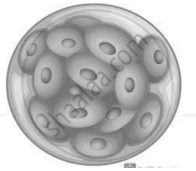Advertisements
Advertisements
प्रश्न
Comment on the role of placenta as an endocrine gland.
उत्तर
Placenta acts as an endocrine gland and produces the human chorionic gonadotropins, human placental lactogen, oestrogen, progesterone and relaxin (later stages of pregnancy). These hormones support foetal growth and help in the maintenance of pregnancy. Hormones like oestrogen, progestogen, cortisol and prolactin are increased several folds in the maternal blood.
APPEARS IN
संबंधित प्रश्न
State the Function of Chorionic Villi
Mention any two functions of the human placenta.
Gonads develop from embryonic ______.
Which extra-embryonic membrane in humans prevents desiccation of the embryo inside the uterus?
In the event of pregnancy, the corpus luteum persists under the influence of ______.
Several hormones like HCG, HPL estrogen, and progesterone are produced by ______.
Except endocrine function, what are the other functions of placenta.
Explain the formation of placenta after the implantation in a human female.
Match the columns I and II with reference to weeks of pregnancy and the development of a human embryo. Select the correct option from the choices given below:
| Column I | Column II | ||
| I. | 8 weeks | (P) | Limbs and external genital organs |
| II. | 12 weeks | (Q) | Limbs and digits develop. |
| III. | 20 weeks | (R) | Body hair develops. |
| IV. | 24 weeks | (S) | Eyelids separate. |
The diagram given below represents a specific stage of human embryonic development. Identify the stage.

